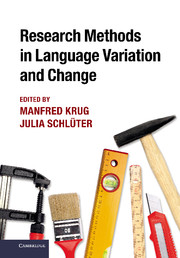Book contents
- Frontmatter
- Contents
- List of Figures
- List of Tables
- List of Contributors
- Preface
- Acknowledgements
- Introduction: Investigating language variation and change
- Part 1 Collecting empirical data
- Part 2 Analysing empirical data
- Part 3 Evaluating empirical data
- Part 3.1 Basic statistical analysis
- Part 3.2 Multifactorial analysis
- 20 Analysing and interpreting variation in the sociolinguistic tradition*
- 21 Identifying multi-dimensional patterns of variation across registers
- 22 Computing linguistic distances between varieties
- 23 Analysing aggregated linguistic data
- Bibliography
- Index
- References
21 - Identifying multi-dimensional patterns of variation across registers
Published online by Cambridge University Press: 05 June 2014
- Frontmatter
- Contents
- List of Figures
- List of Tables
- List of Contributors
- Preface
- Acknowledgements
- Introduction: Investigating language variation and change
- Part 1 Collecting empirical data
- Part 2 Analysing empirical data
- Part 3 Evaluating empirical data
- Part 3.1 Basic statistical analysis
- Part 3.2 Multifactorial analysis
- 20 Analysing and interpreting variation in the sociolinguistic tradition*
- 21 Identifying multi-dimensional patterns of variation across registers
- 22 Computing linguistic distances between varieties
- 23 Analysing aggregated linguistic data
- Bibliography
- Index
- References
Summary
Introduction
For many years, researchers have studied the language used in different situations: the description of registers (a language variety defined by its situational characteristics, including the speaker’s purpose, the relationship between speaker and hearer, and the production circumstances). Although registers are defined in situational terms, they can also be compared with respect to their linguistic characteristics: the study of register variation. Register variation is inherent in human language: a single speaker will make systematic choices in pronunciation, morphology, lexis, and grammar reflecting a range of situational factors.
However, despite the fundamental importance of register variation, there have been surprisingly few comprehensive analyses of the register differences in a language. This gap is due mostly to methodological difficulties, analysing the full range of texts, registers, and linguistic characteristics required for such a study. With the availability of large on-line text corpora and computational analytical tools, such analyses have become possible. Multi-Dimensional (MD) analysis was developed as a corpus-based methodological approach for this purpose, with the goals of identifying the salient linguistic co-occurrence patterns in a language (in empirical/quantitative terms) and comparing registers in the linguistic space defined by those co-occurrence patterns. The approach was first used in Biber (1985, 1986) and then developed more fully in Biber (1988).
- Type
- Chapter
- Information
- Research Methods in Language Variation and Change , pp. 402 - 420Publisher: Cambridge University PressPrint publication year: 2013
References
- 6
- Cited by



